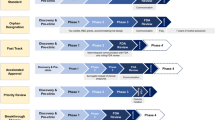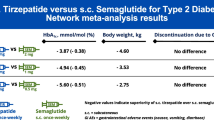Summary
Clinical trials that aim to establish efficacy in the target population need to have an adequate control group. Although scientific principles for efficacy evaluation apply universally, actual choices of control in each region seem to be unique, reflecting differences in regional guidelines for clinical evaluation, preferences of the population, and constraints in study environments.
Our survey targeted 76 drugs approved in Japan between April 1999 and July 2000 and showed that active-control was adopted in a significant proportion of controlled phase III trials (74%), while trials with placebo-control accounted for only 18% of the total. The placebo-control was also not so common in phase II (23%). Preference for active-control was observed in many therapeutic fields, but in a few categories such as anti-diabetics placebo-control trials seemed to be the norm.
We analysed the possible impact of a new international guideline (ICH-E10) that focuses on the intrinsic defects of active control trial. An economic model suggested that the guideline’s introduction could lead to more placebo-control and that the extent of such shift would depend on the increase in cost for active-control trials and possible changes in the requirements for approval. Future patients seem to be major beneficiaries from the new guideline’s introduction, considering the history of Japanese efficacy evaluation.






Similar content being viewed by others
References
International Federation of Pharmaceutical Manufacturers Associations (IFPMA). The value and benefits of ICH to industry. Geneva: IFPMA; 2000.
Dubey SD. Clinical and statistical aspects of drug approval. Clin Evaluation 1992; 20:41–53.
Ono S, Kodama Y. Clinical trials and the new good clinical practice guideline in Japan. Pharmacoeconomics 2000; 18:125–141.
Flaherty MP, Struck D. Life by luck of the draw. Washington Post, 22 December 2000.
Brennan TA. Proposed revisions to the Declaration of Helsinki. New Engl J Med 1999; 341:527–531.
International Conference on Harmonisation (ICH) Harmonised Tripartite Guideline (step 4). Choice of control group and related issues in clinical trials. Geneva: ICH-secretariat; 2000.
Information on recently approved pharmaceuticals. Japan Pharmacists Education Center. http://www.jpec.or.jp/contents/C01/link.html. [Accessed 29 January 2001].
Yoshino H. Clinical and pathophysiological background between Japan and Western countries in the fields of neurology and psychiatry. Clin Evaluation 2001; 28 (Suppl XV):81–83.
Controller committee. Results of clinical trials by therapeutic category (1974–1992) [in Japanese]. Clin Evaluation 1992; 20 (Suppl VI):13–14.
Fukuhara S, Tanabe N, Sato K, Ohashi Y, Kurokawa K. Good clinical practice in Japan before and after ICH. Int J Pharm Med 1997; 11:147–153.
Kodama Y. Findings in GCP audits [in Japanese]. Bull Osaka Pharmaceutical Manufacturers Ass 2000; 620:25–45.
European Agency for the Evaluation of Medicinal Products (EMEA). Applications in the centralised procedure 1995 to July 1999. An analysis of outcomes. CPMP/602/00; 15 March 2000.
Temple R, Ellenberg SS. Placebo-control trials and active-control trials in the evaluation of new treatments. Part 1: Ethical and scientific issues. Ann Intern Med 2000; 133:455–463.
Ellenberg SS, Temple R. Placebo-controlled trials and active-control trials in the evaluation of new treatments. Part 2: Practical issues and specific cases. Ann Intern Med 2000; 133:464–470.
Ikegami N, Michell W, Penner-Hahn P. Pharmaceutical prices, quantities and innovation. Pharmacoeconomics 1994; 6:425–433.
New drug pricing taskforce. Taskforce report (8 July, 1983). In: Guidebook of healthcare insurance and drug tariff. Osaka: Osaka Pharmaceutical Manufacture Association; 1999. pp. 149–152.
Nakano S. Current status of informed consent in Japanese clinical trials [in Japanese]. Jap Pharmacol Ther 1997; 25:2223–2247.
Dollery CT. Why international harmonization is necessary? Clin Evaluation 1992; 20:95–101.
Ministry of Health, Labor and Welfare. Administrative notification on ICH-E10 guideline, No.136, 26 February 2001.
Uesaka H, Morikawa T, Uwoi T. Issues in design and quality of a non-inferiority trial [in Japanese]. Jap J Biometrics 2000; 20:201–215.
Hwang IK, Morikawa T. Design issues in non-inferiority/equivalence trials. Drug Info J 1999; 33:1205–1218.
Anonymous. Reasons why the four cerebral-metabolism enhancers had to be withdrawn [in Japanese]. Mix, September 1998. pp. 82–88.
International Conference on Harmonisation (ICH) Harmonised Tripartite Guideline (step 4). Ethnic factors in the acceptability of foreign clinical data. Geneva: ICHsecretariat; 1998.
Acknowledgements
The views and opinions presented here are only those of the authors and not of the organizations to which the authors belong. Professor Nagasawa was a co-rapporteur of the ICH-E10 Expert Working Group and the other authors were nominated members of the Group.
Author information
Authors and Affiliations
Corresponding author
Rights and permissions
About this article
Cite this article
Ono, S., Shibata, T., Morikawa, T. et al. Choice of control group in efficacy-showing clinical trials in Japan: does the ICH-E10 guideline change conventions?. International Journal of Pharmaceutical Medicine 16, 79–86 (2002). https://doi.org/10.2165/00124363-200204000-00005
Published:
Issue Date:
DOI: https://doi.org/10.2165/00124363-200204000-00005




